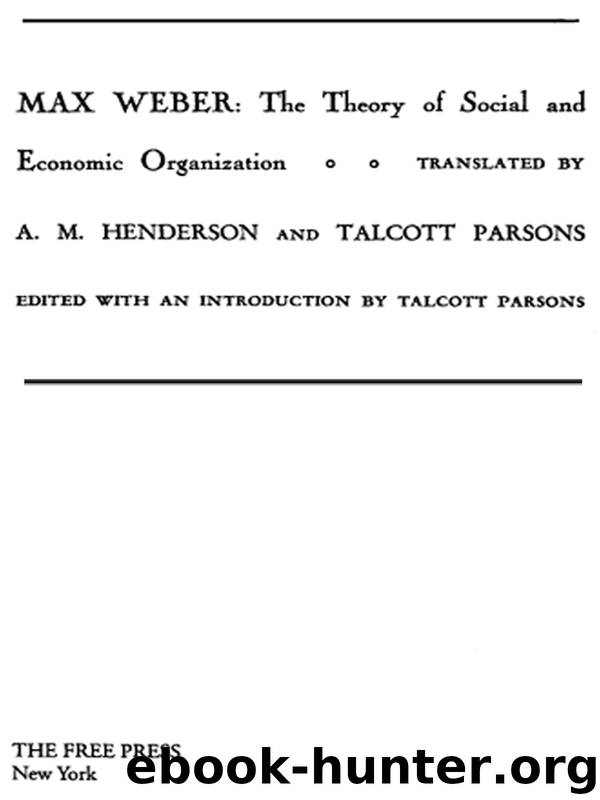The Theory of Social and Economic Organization by Max Weber

Author:Max Weber
Language: eng
Format: epub
Publisher: Free Press
SOCIAL ASPECTS OF THE DIVISION OF LABOUR—(Continued)
The Appropriation of the Non-Human Means of Production
The non-human means of production may be appropriated by workers as individuals or as corporate groups, by owners, or by regulating groups consisting of third parties.
When appropriated by workers, it may be by the individual worker who then becomes the ‘owner’ of the non-human means of production; or the appropriation may be carried out by a more or less completely closed group of workers so that, though the individual worker is not the owner, the corporate group is. Such a corporate group may carry out its functions as a unitary economy as on a ‘communistic’ basis, or with appropriation of shares.70 In all these cases, appropriation may be used for the purposes of budgetary administration or for profit making.71
Appropriation by individual workers may exist in a system of completely free market relations, as between small peasants, artisans, boatmen, or taxi-drivers, each owning his own means of production. Where it is not the individual but a corporate group which is the agent of appropriation, there is a wide variety of possibilities, varying particularly with the extent to which the system is of a budgetary or a profit-making character. The household economy, which is in principle neither necessarily primitive nor in fact communistic, may be oriented wholly to provision for its own needs. Or it may, perhaps only occasionally, dispose of surpluses of certain types of raw material accumulated by virtue of a favourable location, or of products derived from some particular technical skill, as a means to better provision. This occasional sale may then develop into a regular system of profit-making exchange. In such cases it is common for ‘tribal’ crafts to develop with an interethnic specialization of function and exchange. Generally speaking, marketability depends on maintaining a monopoly, which in turn is usually secured by inherited secrets. These may develop into wandering craft groups or possibly pariah72 crafts. It is also possible, as in India, where these groups are united in a political structure and where there are ritual barriers between the ethnic elements, for them to develop into castes.
The case where members of the group possess appropriated shares is that of ‘producers’ co-operation.’73 Household economies may, with the development of money accounting, approach this type. Otherwise, it is only occasionally found, as an organization of workmen. There is, however, one important case closely approaching this type—the mining industry of the early Middle Ages.
Since appropriation by organized groups of workers has already been discussed, appropriation by ‘owners’ or organized groups of them can mean only the expropriation of the workers from the means of production, not merely as individuals, but as a whole. An owner may in this connexion appropriate one or more of the following items: land, including water; subterranean wealth; sources of power; work premises; labour equipment, such as tools, apparatus and machinery; and raw materials. In any given case all these may be concentrated in a single ownership or they may be appropriated by different owners.
Download
This site does not store any files on its server. We only index and link to content provided by other sites. Please contact the content providers to delete copyright contents if any and email us, we'll remove relevant links or contents immediately.
International Integration of the Brazilian Economy by Elias C. Grivoyannis(109917)
The Radium Girls by Kate Moore(12017)
Turbulence by E. J. Noyes(8040)
Nudge - Improving Decisions about Health, Wealth, and Happiness by Thaler Sunstein(7690)
The Black Swan by Nassim Nicholas Taleb(7106)
Rich Dad Poor Dad by Robert T. Kiyosaki(6607)
Pioneering Portfolio Management by David F. Swensen(6288)
Man-made Catastrophes and Risk Information Concealment by Dmitry Chernov & Didier Sornette(6004)
Zero to One by Peter Thiel(5786)
Secrecy World by Jake Bernstein(4740)
Millionaire: The Philanderer, Gambler, and Duelist Who Invented Modern Finance by Janet Gleeson(4465)
The Age of Surveillance Capitalism by Shoshana Zuboff(4274)
Skin in the Game by Nassim Nicholas Taleb(4237)
The Money Culture by Michael Lewis(4198)
Bullshit Jobs by David Graeber(4179)
Skin in the Game: Hidden Asymmetries in Daily Life by Nassim Nicholas Taleb(3988)
The Dhandho Investor by Mohnish Pabrai(3758)
The Wisdom of Finance by Mihir Desai(3731)
Blockchain Basics by Daniel Drescher(3574)
